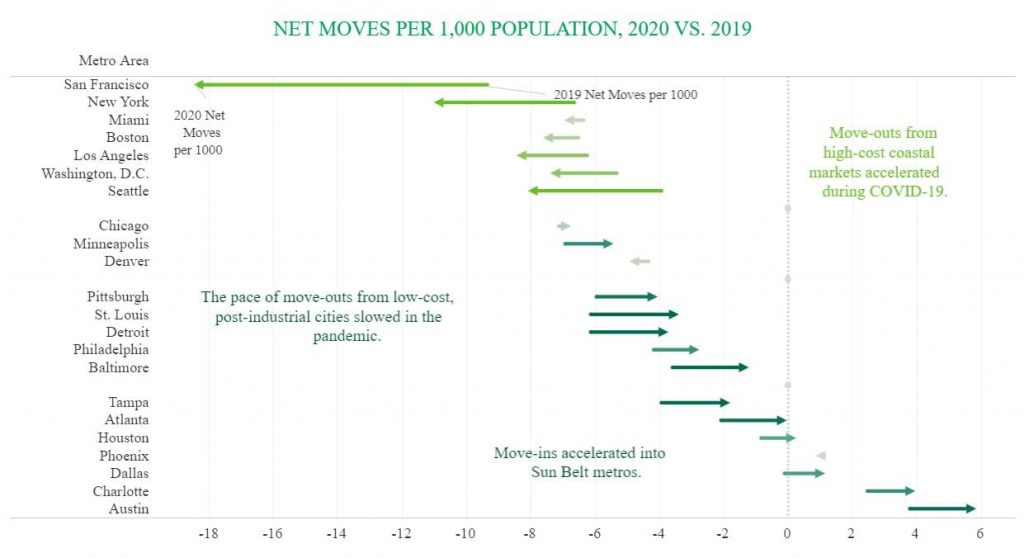Salaries Are Rising At Historic Rates

We’re living in unprecedented times, and I’m not even talking about the pandemic.
Rather, I’m referring to the U.S. economic rebound from 2020. I’ve witnessed firsthand the bounceback from the 2001 dot-com bust and the 2008 financial crisis. What we’re experiencing now is crazier. It’s a slingshot. There’s nothing gradual about it.
Perhaps my perspective is skewed due to the migration of companies and people to Texas and Austin (see below chart). But I think it’s bigger than that. The stock market is rising, government stimulus payments are being spent nationwide, and demand is surging across multiple jobs sectors. In March, the unemployment rate dropped to 6%.
The result? Salary inflation is rising faster than at any point in my 23-year career in the recruiting industry.

Factors Impacting Salary Growth
We’re seeing myriad factors contributing to rising compensation.
- Geography: Job seekers and job postings no longer have the same geographic restrictions. Companies now recruit nationwide. While this expands the candidate pool, it also creates new competition for top talent in certain parts of the country.
- Open to offers: Many employees took pandemic pay cuts. Now these people want to be compensated for that “sacrifice,” so to speak. As a result, more people are considering job changes and listening to offers. Companies are wooing them with money.
- Competition: Most companies curtailed their hiring or announced layoffs starting in March 2020. Now, these companies are playing catch-up as they project growth and revisit projects that were sidelined during COVID-19. Everyone’s hiring at the same time.
- Buying trends: Industries like e-commerce, 3PL, cybersecurity, telecom, grocery delivery, and telehealth took off during the pandemic. These are the fastest-growing jobs sectors, and the impact is far-reaching.
Recommendations For Companies In This Market
A typical “cost of living” raise is 3-5% annually, but that’s insufficient to keep top talent in this environment.
For roles in software engineering and development, project management, data science, and civil and mechanical engineering, we’ve seen salaries rise 10-30% for the exact same role this year vs. last year.
A $100k annual salary for a software developer pre-pandemic now pays approximately $130k per year. I believe we’re on the front end of this shift. Expect these salaries to rise further.
Our advice to companies is to evaluate your business closely. If your profit margins are growing, but you’re not paying your employees or vendors more, we suggest right-sizing your compensation to hang on to your best people and attract new talent. Do a salary audit to see how close you are to the market average.
In the book, “No Rules Rules: Netflix and the Culture of Reinvention,” I learned that Netflix encourages all of its employees to take calls from recruiters. They want to know what the market is paying, so they ask employees to present job offers to them. If you’re a valued employee, Netflix will beat any offer you present. It’s part of their culture of transparency.
Even if your company is not part of the rising economic tide right now, it may still be worth it to increase your staff’s salaries. Realize that it’s easier than ever for your employees to go elsewhere, and act accordingly.
Missing out on new hires is one thing, but pay close attention to your attrition rate. Losing your best and brightest employees can create ripple effects that are difficult to recover from.
Do you need help with a salary audit? Want a free consultation to address your hiring and employee retention practices? Email us at sales@recruitAbility.ai.